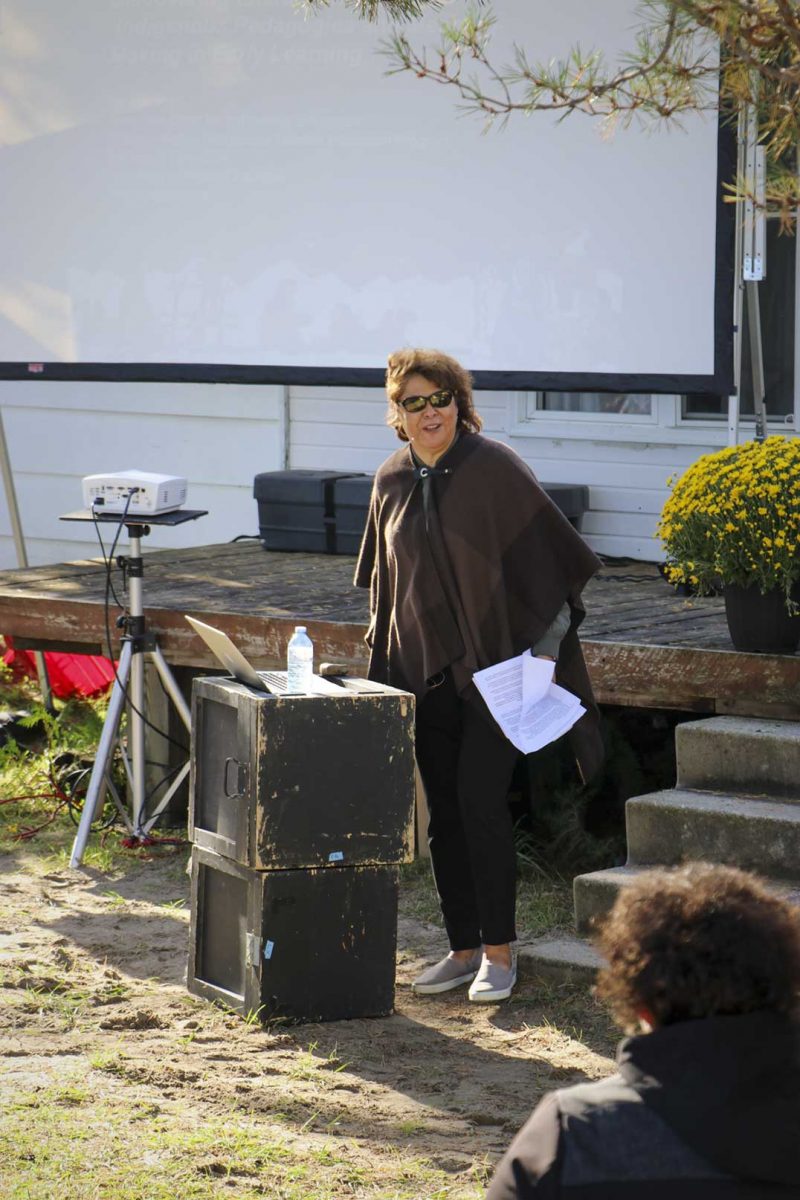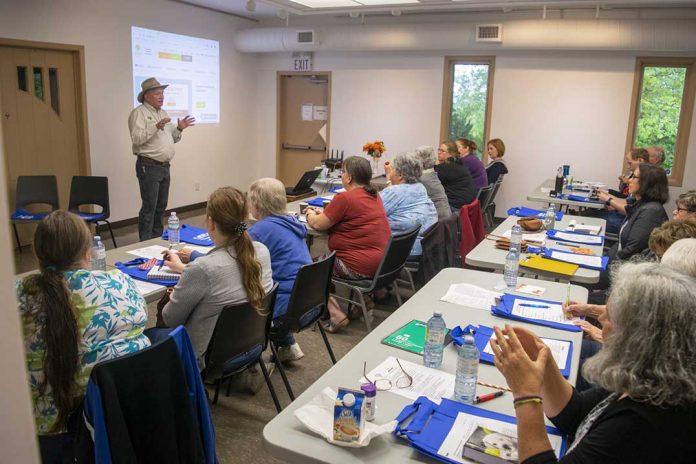M’CHIGEENG – Early childhood education students from 28 First Nation communities across Ontario met September 24 for a three-day event in M’Chigeeng. The Indigenous Centre of Excellence hosted the gathering held at a few M’Chigeeng locations including the tent and trailer park, the Woodlands site, the college and the community complex. Co-hosted by the Ontario Aboriginal Head Start Association and Kenjgewin Teg (KT), the event was titled Indigenous Pedagogy in Early Years and Child Care Development and featured guest speakers and workshops.
The occasion began with a sunrise ceremony conducted by Alma Jean Migwans and Geraldine Ense-McGregor followed by opening remarks from Stephanie Roy, the executive director of Kenjgewin Teg.
“Boozhoo. Waabanog dishnikoz. Jiijaak ndoodem,” she said. “I just want to welcome you all to the Anishinabek Territory here on Mnidoo Mnising. I know many of you have travelled a long way to join us today for this pedagogy in the early years. This topic has always been close to my heart as a former primary teacher in the elementary school system. My research has always taken me to look at models of delivery that include eight key principles.”
Ms. Roy outlined these principles as community relevancy, inclusion of families, Anishinabek values, customs and traditions, embedding our clans, stories, dance and language in everything we do, inquiry-based approaches, experiential experiences and stewardship and sustainability.
“I contend,” Ms. Roy asserted, “that these are the foundations that will give our children roots to ground them so they will be confident in their aspirations into young people. I have had the privilege to lead an Anishinabek Reggio inspired school from 2013 to 2109. It was amazing to see the transformation of four-year-olds problem solve and use the flow of the day that was child-centred and where the children say themselves that they are every day in the most culturally rich learning environment that could have been imagined. It was situated at the Ojibwe Cultural Foundation. I have no doubt that this Mnidoo Mnising Anishinabek Kinoomaage (MMAK) Gamig model would continue to lead in language and child development for the years to come with many Indigenous Nations around the world. You will see a small example of this at the learning labs today. This is where we see learning on the terms of children with cultural relevancy and learning outside four walls. Something I think all of our First Nation, Metis Inuit (FNMI) children have a right to access in our systems we all work within.”
Ms. Roy went on to thank conference planner Debbie Debassige, a former employee of KT and a lifetime educator, teacher and leader in Indigenous education.
Next was an opening address by Shannon Murphy, provincial manager, Ontario Indigenous Centre of Excellence (OICOE) followed by lighting the qulliq and talk by OICOE Elder Ina Zakai, an Inuit grandmother.
“I get to visit the communities and see the gifts that they carry and get to see the barriers they wish to overcome,” Ms. Murphy told The Expositor. “Our team, I call them carpenters because they get to build bridges to other communities to support knowledge exchanges in early learning. It is important that when doing the land-based conference we are also holding up and acknowledging the elders, knowledge keepers and educators from this community. That they see themselves as leadership in early learning.”

Elder Zakai then told her audience, “I feel like I come home when I see you guys. A special privilege when I gather with you.” She went on to speak of her number, E67480, that the Canadian government gave her. “Mom and dad and four siblings all got numbers. Kids will no longer be named as numbers. The number one goal is that they are going to be known for who they are, not numbered.”
Keynote speaker Dr. Jan Hare, professor, associate dean, Indigenous Education Director at the University of British Columbia then spoke to the students. Ms. Hare has ties to M’Chigeeng as she is the daughter of former Chief Joe Hare. Her specialty is early childhood education.
“I started work in literacy while working on my Ph.D.,” Dr. Hare said. “I did research in M’Chigeeng. In terms of PhDs, I recognize our elders. Literacy across three generations. Our language and literacy practices were shaped for them. Our families are deeply involved with their children. The older generation talked about the connection to the land.”
Dr. Hare worked with 10 families while doing this research and told her audience that “most of the people who took part in the work had been in residential schools. They used literacy as a tool for change, for self-preservation. The younger generation used their literacy in school. So three generations maintaining and nurturing their literacy. Also, the school-based literacy. Many of our traditions are linked to school-based literacy. My dad was a really big help to me. He introduced me to some families. How they learn. The oral traditions in communities help teachers. Our history of schools, residential, institutional, that fear is still a reality.”
Dr. Hare went on to talk about school readiness, about self-esteem and the support of literacy and learning. When she spoke of the Ontario Head Start Association, she said that studies showed that children who attended those programs are better prepared for school. “There are so many benefits to early learning,” she said. Dr. Hare also spoke of the change in intergenerational learning. “We are starting to see young children bringing this knowledge home. Sharing the language that they learn in school. Practices that commit to learning. Experiential learning, drumming, beading, maple syrup. Being closely aligned with the land. Connected through stories and song. Oral storytelling was the primary mode of passing on knowledge through the generations. Building their knowledge and developing critical thinking.” Dr. Hare finished by telling the students, “Give them the tools to make decisions. A sense of mindfulness. A sense of gratitude and empathy.”
The second keynote speaker was educator Karyn Callaghan of Hamilton. She was on the faculty of Mohawk College, is the President of the Ontario Reggio Association, and has been a keynote speaker in Canada, the United States, Asia and Australia. Her topic was honouring Indigenous ways of knowing through documentation.
“I hear many stories,” Ms. Callaghan said. “Stories that touched me deeply. It’s important when we are talking about children to have children with us. We are all stories, we hear stories. Some of these stories may actually be hindering us when we are teaching. We can help each other. As teachers, we can be the best educators we can be.”
Ms. Callaghan used videos to show children at different ages and asked questions. She introduced 11-month-old Laura who wants to see a watch. “What do you understand about Laura from what you saw?” she asked. “What do you understand about the role of adults from what you saw? How many teachers are there in this encounter? The baby is a teacher. The environment is a teacher. The book with photos. Stopped at the photo of a watch. The photograph is a teacher. Children show us all the time how they respond. Documentation gives a gift back to the child. It is validation that they were seen and heard, without judgement. Binders of documentation. Kids will come back to see themselves. It also makes the intelligence of the teacher valid. When we document, others can see it, can read about it. Documentation is wonderful for families. The work can always be in progress. You can always add to it. It is a record of relationships and the meanings we make.”
The educational sessions at this event included Clans and Identity with facilitator elder Gordon Waindubence, Collaborative Inquiry within Indigenous Context with Melanie Manitowabi, Water Teaching with Kim Debassige and elder Roberta Oshkabewisens, Cradle Board Teaching with elder Marilyn Debassige and Ina Zakal and Medicine Walk and Drum teachings with Falcon Migwans. The Journey Together staff and knowledge keepers facilitated the sessions titled Indigenous Pedagogy in Action in Natural Setting, and others were Storytelling with Leona Nahwegahbow and Evelyn Roy, Ask an Elder with elders Raymond Owl and Emma Meawasige and Deepening Your Knowledge with elders Zakal, Owl, Meawasige, Roy and Florrie Sutherland.




